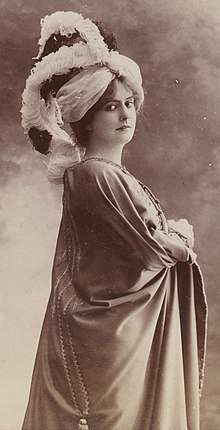Jeanne Raunay
Jeanne Richomme Raunay (25 November 1868 – 1942) was a French mezzo-soprano opera singer. She was also the daughter of painter Jules Richomme, and the wife of French writer André Beaunier.
Jeanne Raunay | |
|---|---|
 Jeanne Raunay, by Reutlinger. | |
| Born | Jeanne Richomme 25 November 1868 Paris |
| Died | 1942 |
| Nationality | French |
| Other names | Jeanne Raunay-Demeny, Jeanne Richomme, Jeanne Filleau, Jeanne Filleau-Raunay |
| Occupation | opera singer |
| Years active | 1888-1908 |
| Relatives | Jules Richomme (father) André Beaunier (husband) |
Early life
Jeanne Richomme was born in Paris, the daughter of painter Jules Richomme. Her grandfather was engraver Théodore Richomme.[1]
Career
Raunay's opera debut came in 1888, at the Paris Opera, when she sang Uta in Reyer's Sigurd. She joined the Theatre de la Monnaie in Brussels from 1895 to 1897, and was the first to sing Guilhen in D'Indy's Fervaal (1897).[2] She joined the Opéra-Comique in Paris in 1898, where she was the first to sing Jeannine in Bruneau's L'Ouragan (1901). Other appearances by Raunay included roles in Tannhäuser, Faust, Fidelio, Iphigénie en Tauride, Hérodiade, and Lohengrin. She was considered a beauty of the opera stage.[3] "Blonde, graceful, radiantly beautiful and supremely elegant, Jeanne Raunay counts among the rare singers of real worth whose reputation owes nothing to vulgar réclame or to petty intrigue," noted an American magazine of Raunay, in 1905.[4]
Raunay retired from opera when she married, but she continued singing in concert. In 1910, she sang at the first concert of the Société musicale indépendante, with her friend[5] Gabriel Fauré as her accompanist. In 1923 and 1924 she gave joint recitals with pianist Marguerite Long, performing music by contemporary French composers such as Ravel, Debussy, and Fauré.[6] She taught singing later in life; among her students was Jeanne Manceaux, the older sister of composer Francis Poulenc.[7]
Several composers dedicated works to Raunay. When Fauré's complete song cycle La chanson d'Ève was published in 1911, it was dedicated to Raunay, who had sung much of the work in its premiere performances.[8] Ernest Chausson dedicated his "Chanson perpétuelle" to her. Charles Bordes also dedicated a composition to her, when the song was published in 1914.[9]
Personal life
Jeanne Raunay married twice. In 1889, she married a doctor, Albert Filleau. He died in 1895.[10] She married French writer André Beaunier in 1908. Beaunier died in 1925.[11] She died in 1942, aged 73 years.
References
- Ringrose, Hyacinthe (1910). The International Who's who: Who's who in the World, Incorporated with the International Blue Book. International Who's Who Publishing Company. p. 690.
- "Fervaal in Paris". The Morning Post. May 12, 1898. p. 7. Retrieved August 12, 2019 – via Newspapers.com.
- "Stage Beauties of Note". The Philadelphia Inquirer. July 15, 1906. p. 32. Retrieved August 12, 2019 – via Newspapers.com.
- "Jeanne Raunay an Artist". The Musical Courier. 50: 11. January 18, 1905.
- Johnson, Graham (2009). Gabriel Faure. Ashgate Publishing, Ltd. p. 323. ISBN 9780754659600.
- Dunoyer, Cecilia (1993). Marguerite Long: A Life in French Music, 1874-1966. Indiana University Press. pp. 36–37, 87. ISBN 9780253318398.
- Schmidt, Carl B. (2001). Entrancing Muse: A Documented Biography of Francis Poulenc. Pendragon Press. p. 471. ISBN 9781576470268.
- "Fauré - La chanson d'Eve, Op. 95 (voice and piano)" (PDF). IMSLP/Petrucci Music Library. Retrieved 2019-08-13.
- "Mes cheveux dorment sur mon front (Bordes, Charles)". IMSLP/Petrucci Music Library. Retrieved 2019-08-13.
- "Parisian Topics". The Standard. December 3, 1895. p. 5. Retrieved August 12, 2019 – via Newspapers.com.
- Sorday, Paul (January 3, 1926). "M. André Beaunier, Critic and Skeptic". The New York Times. p. BR11 – via ProQuest.
External links
- Jeanne Raunay in "Fervaal" by Vincent d'Indy, photographed by Aimé Dupont, 1897; in the Bibliothèque nationale de France.
- Jeanne Raunay at BnF Data.
- Madame André Beaunier, Habitants célèbres du Vésinet (Société d'Histoire du Vésinet 2008).